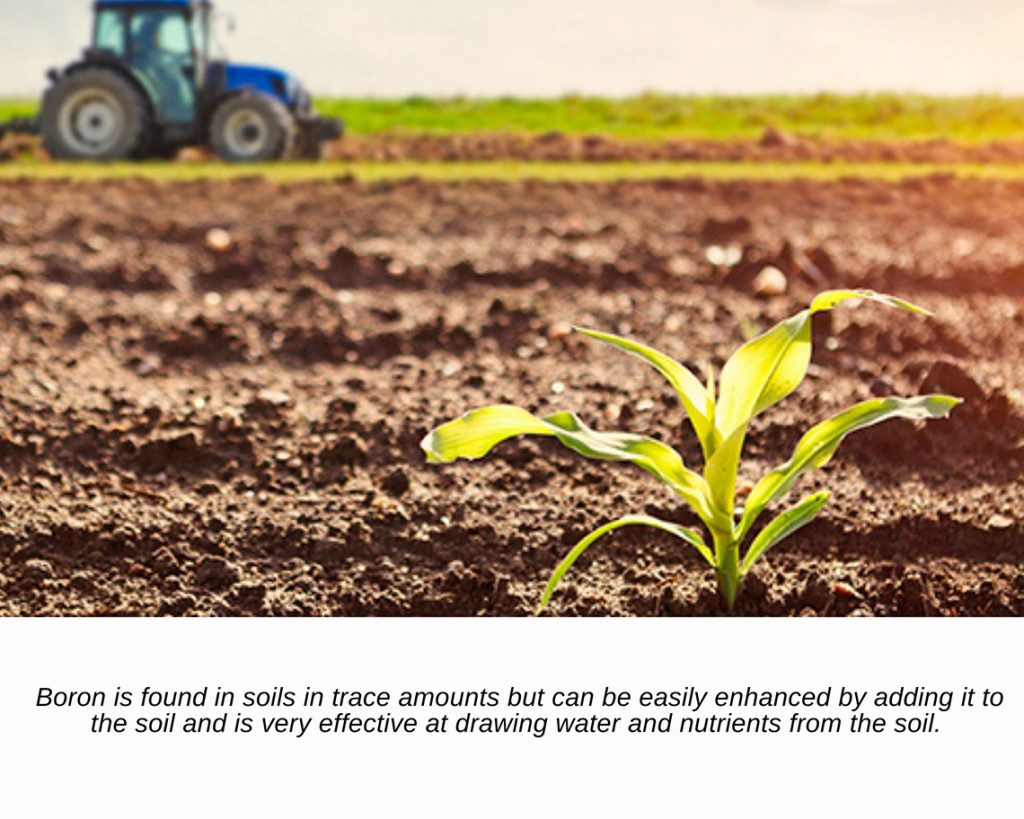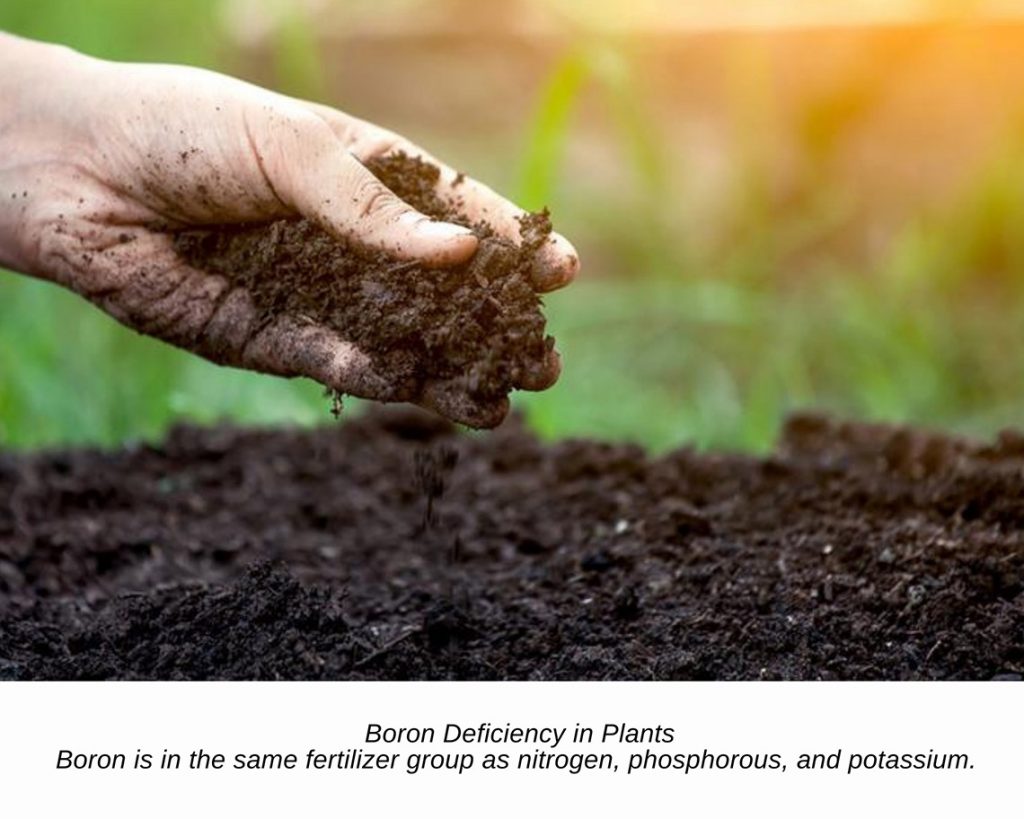Boron is a relatively rare mineral in the Earth’s crust, making up only 0.03% of the Earth’s crust, or about one-tenth the amount in a teaspoon of table salt. Boron is a non-metal, a metalloid, and a post-transition metal belonging to the boron group. It’s a chemical element in the boron group, including aluminum, silicon, and carbon. Boron is a bright bluish-white metal that turns a faint yellowish-white when exposed to air in its elemental form.
Boron is a chemical element that is often used in fertilizers. It is a silvery-white, lightweight metal that has a high atomic weight. Boron has a lot of uses in production, including in making plastics, fertilizers, and many other important chemicals.
Boron as Micronutrient Used in Fertilizers
Boron is an essential element that is present in the soil but can become limited in certain regions. As an element, Boron is widely used in fertilizers. It is widely available in borax, which is one of the major boron sources used to produce boron-based fertilizer.
The fertilizer industry is in a constant race to innovate and improve its products in order to remain competitive. The recent trend is the development of Boron (B) based fertilizer products for the vegetable and tree industries.
Boron is especially important for keeping soil nutrient-rich and improving the quality of crops. This element is supposed to help your plants grow faster and be more resistant to pests. It is one of the most important elements for growing crops.
Boron and the Soil Structure
Boron is a mobile nutrient within the soil, meaning it is prone to movement within the soil. This is found in soil in two forms: boron compounds (B 3 -B 6), which are insoluble, and boron-rich compounds (B 2 -B 6), which are soluble. These two forms work in tandem, working together to help plants flourish.
Boron is highly used in some fertilizers because of its ability to promote plant growth. It is beneficial for plant growth, especially in warmer climates. It plays a vital role in plant metabolism, which means that it is important for plant growth.
The most common and effective method of supplying Boron in the soil is in the form of Nitrogen sources. Nitrogen is the most common element in fertilizer. Nitrogen is needed for all plant growth, but the amount of nitrogen needed by the plant will vary depending on the size of the plant, the stage of growth, and the type of plant. Boron is the ninth most abundant element in the Earth’s crust, but it is not often found in nature.
What soil type has the highest content of Boron?
Boron is found in soils in trace amounts but can be easily enhanced by adding it to the soil and is very effective at drawing water and nutrients from the soil. The boron content in the soil remains fairly constant within an area, but it varies from soil to soil because of organic matter content – the more organic matter, the higher the Boron – and we can see this in the graph. Common sources of Boron in soils include decaying organic matter and the addition of Boron to the soil via fertilizer.

Role of Boron in Plants
Boron is a natural mineral that is commonly found in soil and is required by plants to produce the amino acids methionine and cystine. These two essential amino acids are required to form protein in plants, and for this reason, they are a crucial part of the diet of most edible plants.
Because of its ability to enhance plant growth and reduce the risk of certain types of plant diseases, Boron is one of the most important nutrients for plants.
The plant nutrient boron is a trace element essential for many plant functions. It is a necessary micronutrient for plant growth and has been shown to play a role in transporting various other nutrients. These functions include water and ion transport, ion uptake, phenylpropanoid metabolism, protein synthesis, and pectin, cellulose, and lignin synthesis.
What are the signs that your soil lacks Boron?
Soils containing low levels of Boron may result in reduced yield and plant growth and ultimately reduced yield and plant growth. Symptoms of boron deficiency include:
- Stunted and twisted growth
- The tip of the roots die
- Yellowing and leaf curl
- Cracking and death of leaves
As the most abundant trace element on the planet, Boron (B) serves as a vital nutrient for plants, animals, and humans alike. Unfortunately, it also has one of the highest levels of toxicity, meaning that it’s difficult to find the right dose of Boron without causing serious side effects. But fear not! Despite its toxicity, about 90% of all boron compounds on the planet are present in the form of boron-rich black earth or borate minerals, meaning that these minerals can be safely applied to plants.
Boron Deficiency in Plants
Boron is in the same fertilizer group as nitrogen, phosphorous, and potassium. This is critical to the health of your plants because it serves as a structural element of the cell walls, outer layer of the seeds, and reproductive structures. Small amounts of Boron are required in the soil, but when there is boron deficiency in the soil, the roots are unable to absorb it. Without adequate Boron, plants suffer from nutrient deficiencies and unhealthy leaves.

Boron deficiency is most prevalent in acidic soils. However, with boron fertilizers that are available in the market, the rate is relatively lower. There are some nutrients that are good for the plant’s health, but only when the plant is healthy is it able actually to absorb them. This advice is important in gardening because so many of us have gardens that are unhealthy, with the soil being deficient in nutrients, which can lead to not being able to grow our plants properly.
Conclusion
Boron is a mineral that is highly essential for plant growth. In fact, Boron is a critical element for plant health. The most common source of Boron is the mineral borax, which is a naturally occurring compound. Since Boron is difficult to obtain from many types of soil and water, it is important that we apply Boron to agricultural and gardening products to increase the amount of Boron that we get to consume. Just make sure that we are only adding the right amount of it onto our soil.


